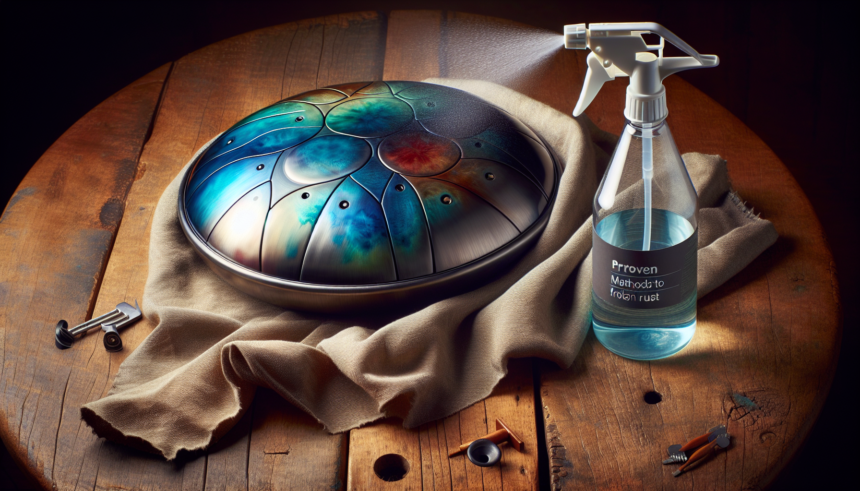<!DOCTYPE html>
<html lang="en">
<head>
<meta charset="UTF-8">
<meta name="viewport" content="width=device-width, initial-scale=1.0">
<title>Article</title>
</head>
<body>
<p>The handpan, also known as a hang drum, is a unique musical instrument known for its ethereal sound and distinct design. Crafted primarily from high-quality steel, the handpan can sometimes be prone to rust if not maintained properly. Rust not only affects the aesthetic appeal of the instrument but can also interfere with its sound quality. Therefore, it is essential for handpan owners to take necessary precautions to protect their instruments from rust. In this article, we will explore proven methods to keep your handpan in prime condition and free of rust.</p>
<h2>1. Understanding the Causes of Rust</h2>
<p>Before diving into prevention methods, it is crucial to understand why rust occurs. Rust is the result of the chemical reaction between iron, moisture, and oxygen. The process, known as oxidation, leads to the formation of iron oxide, commonly recognized as rust. Given that handpans are usually made from steel, which contains iron, they are susceptible to rust when exposed to humid environments or moisture.</p>
<h2>2. Invest in a Quality Handpan</h2>
<p>The first step in protecting your handpan from rust is to invest in a quality instrument. Reputable manufacturers often use quality steel and apply protective coatings that can help prevent rust. If you are unsure about the material or coating used, it’s always a good idea to ask the manufacturer directly or read reviews from other users.</p>
<h2>3. Regular Cleaning</h2>
<p>Regular cleaning is one of the simplest yet most effective methods to prevent rust. After playing your handpan, use a clean, dry cloth to wipe off any oils, sweat, or moisture from your hands. This helps in removing any residual moisture that could initiate rust formation.</p>
<p>Follow up by applying a small amount of isopropyl alcohol or a dedicated handpan cleaning solution. This will not only clean the surface but also evaporate moisture effectively. Remember to use a soft cloth to avoid scratching the surface of your handpan.</p>
<h2>4. Proper Storage</h2>
<p>Where you store your handpan plays a critical role in its preservation. Always keep your handpan in a cool, dry environment, away from any direct sunlight or excessive humidity. Ideally, it should be stored in a padded case that can protect it from physical damage and environmental elements.</p>
<p>If you live in an area with high humidity, consider investing in a dehumidifier for the room where your handpan is stored. This will help in reducing the overall moisture level in the air, thereby minimizing the risk of rust.</p>
<h2>5. Regular Oiling</h2>
<p>Applying oil to your handpan can create a protective barrier that resists moisture. Use a non-abrasive, non-corrosive oil like a dedicated handpan oil or coconut oil. Work a small, even layer onto the surface of the handpan using a soft cloth. Oiling not only helps inhibit rust formation but also maintains the shine of the instrument.</p>
<p>Make sure to remove any excess oil to avoid a sticky or greasy finish, which can attract dust and dirt. It is generally recommended to oil your handpan every couple of months, but the frequency can vary depending on your local climate and how often you play the instrument.</p>
<h2>6. Use Protective Covers</h2>
<p>Using protective covers, like padded bags or cases, can shield your handpan from environmental factors. These covers usually come with moisture-resistant materials that prevent dampness and humidity from reaching your instrument. They also protect the handpan from physical damage such as dings or scratches.</p>
<p>Ensure that your cover is not only protective but also breathable. A breathable cover will prevent moisture from building up inside, thus reducing the chances of your handpan rusting.</p>
<h2>7. Avoid Outdoor Exposure</h2>
<p>While playing your handpan outdoors can be a delightful experience, it also exposes the instrument to elements of nature that could enhance rust formation. Humidity, sudden temperature changes, and even rain can be detrimental to the steel surface of your handpan.</p>
<p>If you must play outside, try to do so during dry weather and always store your handpan away promptly after playing. Avoid placing it on moist surfaces, and always ensure it is wiped down completely before storing it back in its case.</p>
<h2>8. Use Anti-Rust Sprays</h2>
<p>There are several anti-rust sprays available on the market designed specifically for steel instruments like handpans. These sprays typically provide a temporary layer of protection against moisture. However, it’s essential to choose a product compatible with musical instruments as some sprays might affect the sound quality.</p>
<p>Always follow the manufacturer instructions when applying anti-rust sprays and test a small area before applying it to the entire surface of the handpan.</p>
<h2>9. Repair Any Damage Promptly</h2>
<p>If you notice any scratches or dents on your handpan, it is important to address them promptly. These imperfections can expose the steel to moisture, accelerating the rusting process. Many small damages can be repaired at home with suitable tools, but for significant damage, it is recommended to consult a professional.</p>
<h2>Conclusion</h2>
<p>Maintaining a handpan and protecting it from rust is a task that requires consistent care and effort. By understanding the causes of rust and employing the methods described above, you can ensure the longevity and sound quality of your handpan. With the proper investment in care and preventive measures, your handpan can continue to produce its sweet, melodious tones for years to come. Consider your unique environment and adjust these recommendations to safeguard your instrument effectively.</p>
<h2>FAQs</h2>
<h3>What materials are handpans made of?</h3>
<p>Handpans are typically made from high-quality steel. Some handpans may use stainless steel or nitrided steel to enhance resistance to rust. The type of steel used can impact the instrument's sound and durability.</p>
<h3>How often should I clean my handpan?</h3>
<p>It is recommended to wipe down your handpan after each use to remove any moisture, oils, or residues. A more thorough cleaning routine including alcohol or cleaning solutions can be performed every month or according to your usage level.</p>
<h3>Can I use any oil for my handpan?</h3>
<p>No, not all oils are suitable for a handpan. Use non-abrasive, non-corrosive oils like dedicated handpan oil or coconut oil. Avoid oils that leave a sticky residue or are prone to rancidity.</p>
<h3>How can I tell if my handpan is rusting?</h3>
<p>Signs of rust include discoloration, a rough surface, and visible brownish-red patches on the steel surface. Regular checks can help identify rust early, and prompt maintenance can prevent it from spreading.</p>
<h3>Is playing my handpan in the rain harmful?</h3>
<p>Yes, playing a handpan in the rain can introduce moisture to the surface, leading to rust. If your handpan gets wet, dry it thoroughly and apply an oil layer to protect it from rust.</p>
</body>
</html>Proven Methods to Protect Your Handpan from Rust

Leave a comment




